North Carolina Environmental Justice Network Timeline
1980s-1990s
1982
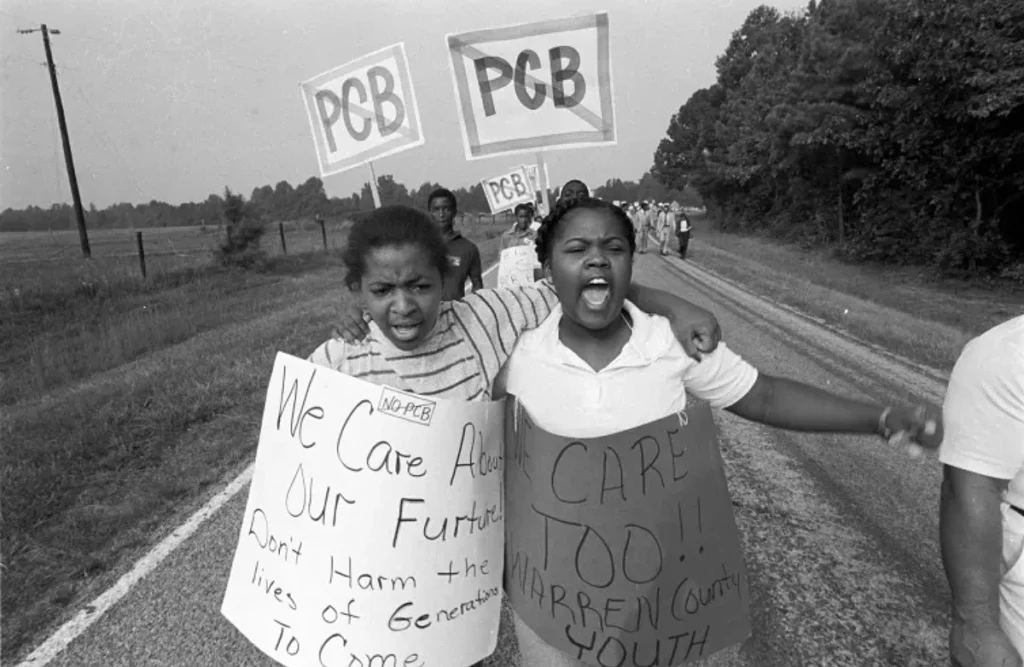
Warren County residents protested the dumping of PCBs in their community, sparking the Environmental Justice Movement, which rapidly spread around the world.
1987
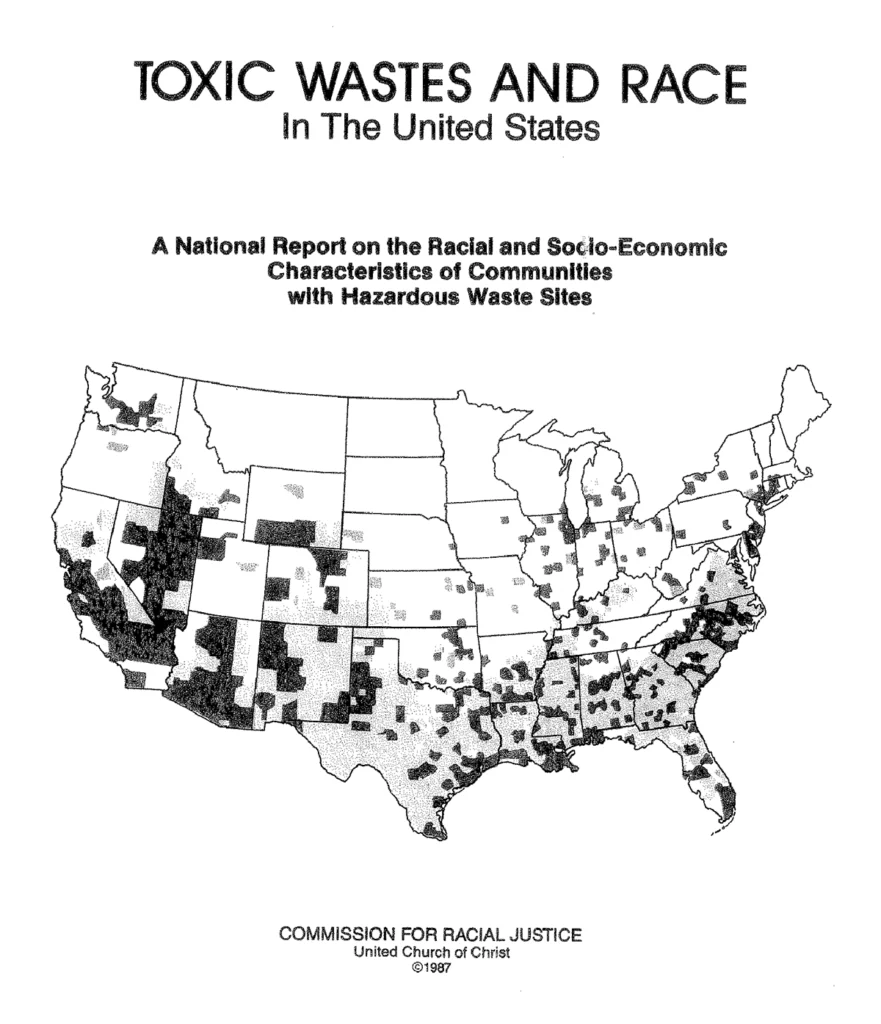
1990s
1990

Robert Bullard published Dumping in Dixie: Race, Class and Environmental Quality.
1991
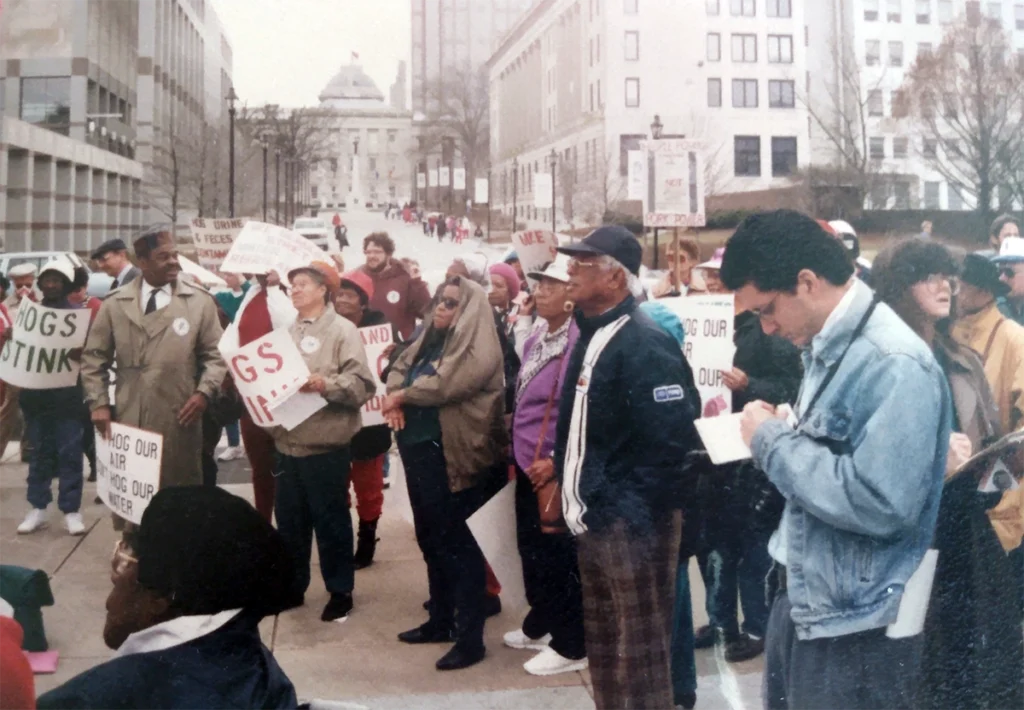
The Concerned Citizens of Tillery (CCT) began organizing against concentrated animal feeding operations (CAFOs) in Halifax County.
1992
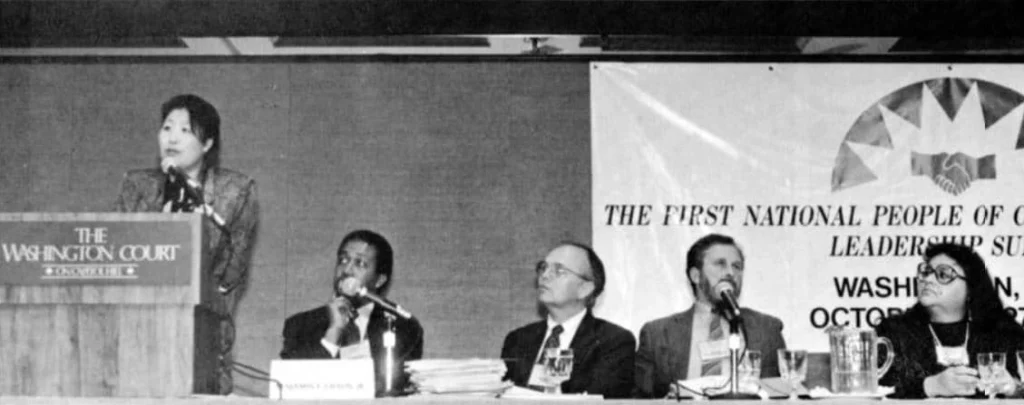
CCT hosted Hogfest II, a large event that mocked Hogfest, a pork industry propaganda event designed to indoctrinate communities. Hogfest II educated communities on the public health and environmental injustices that resulted from CAFOs in nearby counties.
1993
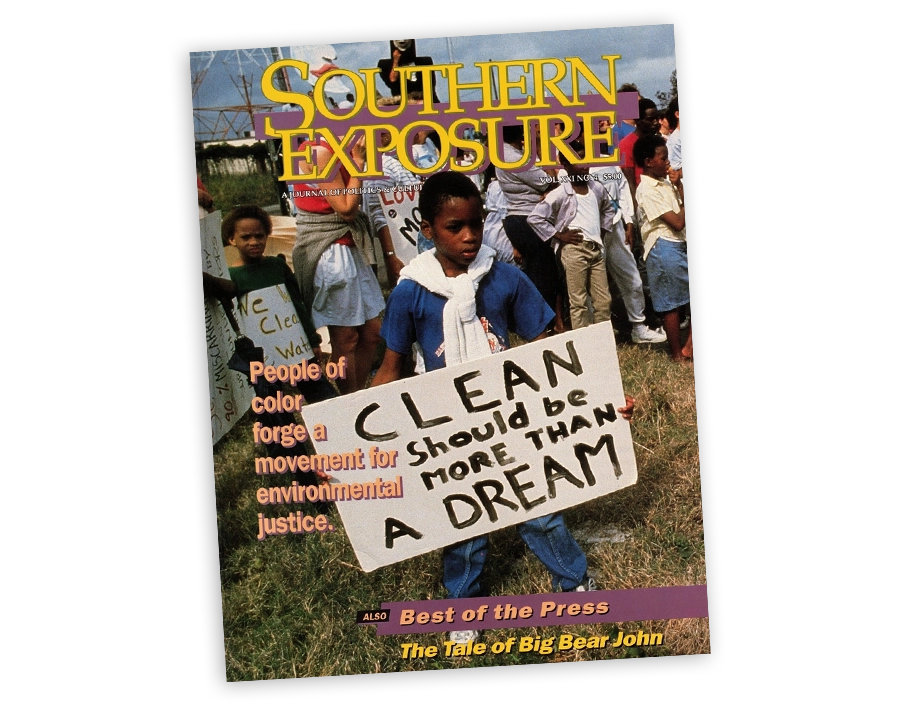
“Tenants and Toxics” by Pat Bryant
Southern Exposure Vol. 21 No. 4, Winter 1993: “It is a story of how African Americans, Latinos, Asian Americans, and Native Americans across the nation have become pivotal to saving the Earth. It is a story of how the struggle against racism and greed is the key to stopping the destruction of people everywhere.”
1993-2001
CCT led Hog Round Table meetings in Tillery, where residents, organizers, environmentalists, and scientists discussed collecting data and pushing for regulations.
1994
CCT successfully pushed Halifax County to pass an ordinance prohibiting the siting of additional hog CAFOs.
March 20, 1995
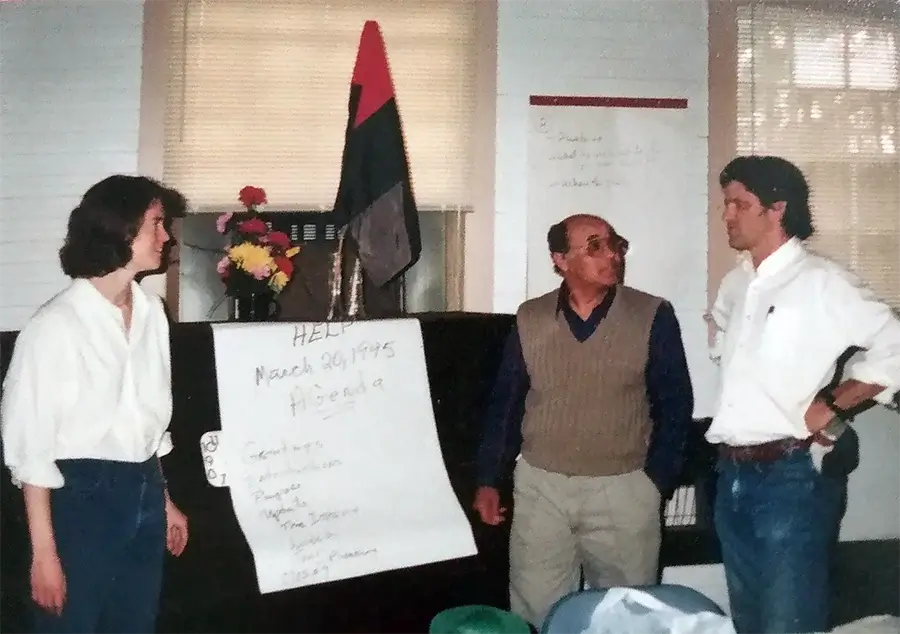
Mary L. Kerr, Gary Grant, and Steve Wing at an environmental justice organizing meeting.
1998
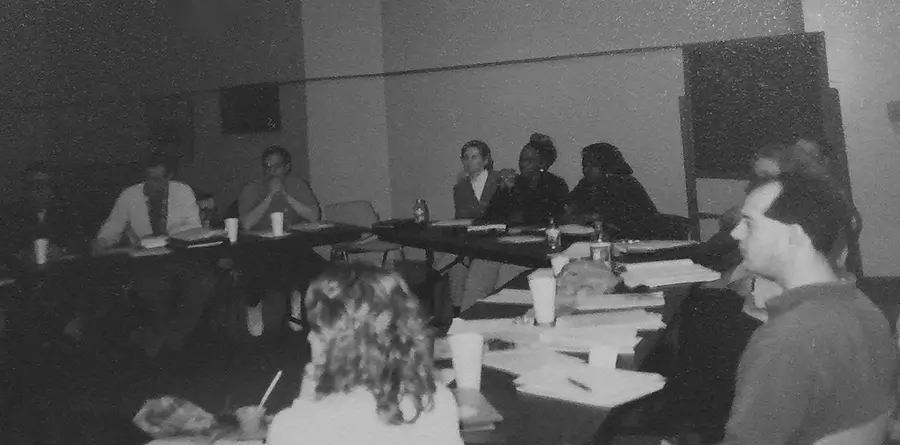
CCT Hog Roundtable Meeting at Warren County Library.
October 24-27, 1998

October 1998: The first Environmental Justice Summit took place at the Historical Franklinton Center at Bricks in Whitakers, North Carolina.[1] Around seventy-five to eighty community members attended.[2] During the Summit, community members decided to found the North Carolina Environmental Justice Network (NCEJN).[2] Gary Grant, Nan Freeland, Don Cavellini, and Steve Wing were among the founders (Interview With Naeema Muhammad and Don Cavellini, 4). NCEJN formalized decades-long partnerships among communities, researchers, and social, political, economic, racial, and environmental justice organizations.[3]
[1] “NCEJN 2009 Organizational Planning Session 8-12-09” (North Carolina Environmental Justice Network, August 12, 2009)
[2] “NO JUSTICE, NO PEACE” AND THE RIGHT TO SELF-DETERMINATION: AN INTERVIEW WITH GARY GRANT AND NAEEMA MUHAMMED OF THE NORTH CAROLINA ENVIRONMENTAL JUSTICE NETWORK
[3] Fiona Morgan, “Activist’s Passing Leaves Many Stunned,” INDY Week, November 17, 2004, Valerie Johnson, PhD, interview by Emma Jo Donnelly, Zoom, July 2, 2024.
1999

NCEJN hired Naeema Muhammad, a seasoned grassroots leader of Black Workers for Justice, to lead community organizing for the Network.[1]
[1] Valerie Johnson, PhD, interview by Emma Jo Donnelly, Zoom, July 2, 2024.
September 16, 1999

Hurricane Floyd made landfall in North Carolina.[1] The hurricane flooded the region, destroying homes, businesses, and other structures.[2] The Janesville Gazette reported that, “many residents lost all that they had.”[3]
[1] NOAA US Department of Commerce, “Hurricane Floyd” (NOAA’s National Weather Service), accessed July 2, 2024, https://www.weather.gov/mhx/Sep161999EventReview; Martha Waggoner, “Treading Water: Hurricane Floyd, Flooding Hit the Poor and Minorities,” The Carolina Times, February 12, 2000, North Carolina Digital Heritage Center.
[2] “Hurricane, Flooding Hit Poor, Minorities,” Janesville Gazette, February 6, 2000, Newspaper Archive.
[3] “Hurricane, Flooding Hit Poor, Minorities,” Janesville Gazette, February 6, 2000, Newspaper Archive.
1999
NCEJN joined the Workers Relief & Aid Project, a coalition of community organizations created to support hurricane survivors.
November 1999
Over one hundred Hurricane Floyd survivors attended the Second North Carolina Environmental Justice Summit.[1]
[1] Martha Waggoner, “Treading Water: Hurricane Floyd, Flooding Hit the Poor and Minorities,” The Carolina Times, February 12, 2000, North Carolina Digital Heritage Center; “Organizational Planning”; Interview With Naeema Muhammad and Don Cavellini, 4.
December 1999
Black leaders in the Environmental Justice Movement from across the United States attended a meeting of the African American Environmental Justice Action Network in Arlington, Virginia to organize and build their networks. Gary Grant and Steve Wing represented NCEJN.[1]
2000s
2000
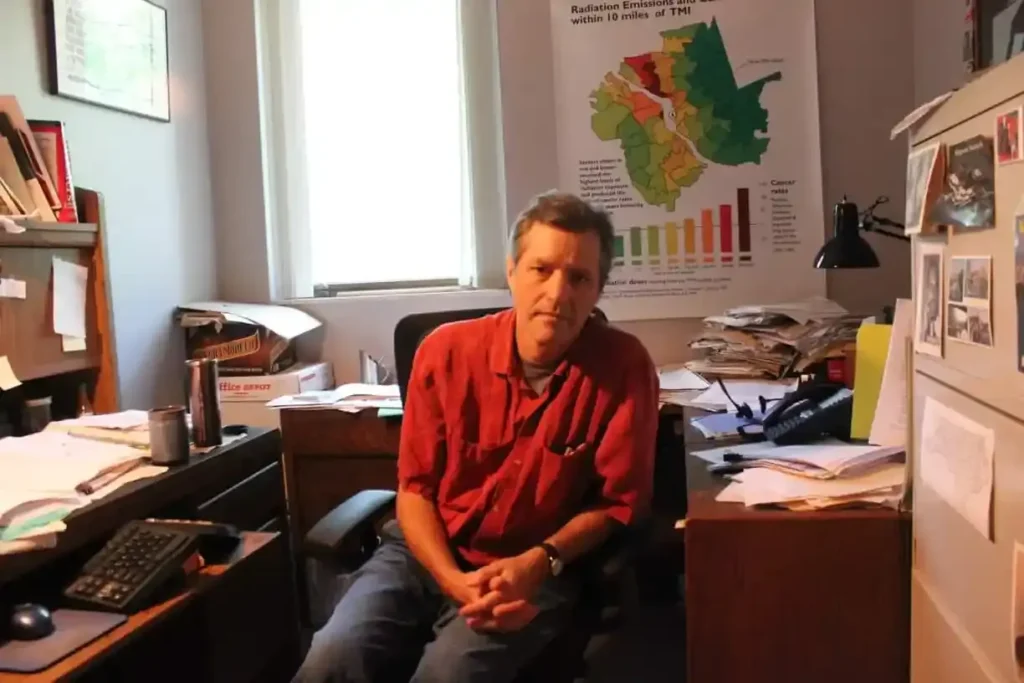
The People’s Professor Steve Wing created the Integrating Epidemiology & Environmental Justice course at UNC–Chapel Hill. Wing co-taught the course with Naeema Muhammad. Eight years after Wing’s passing, the course remains.
October 2000
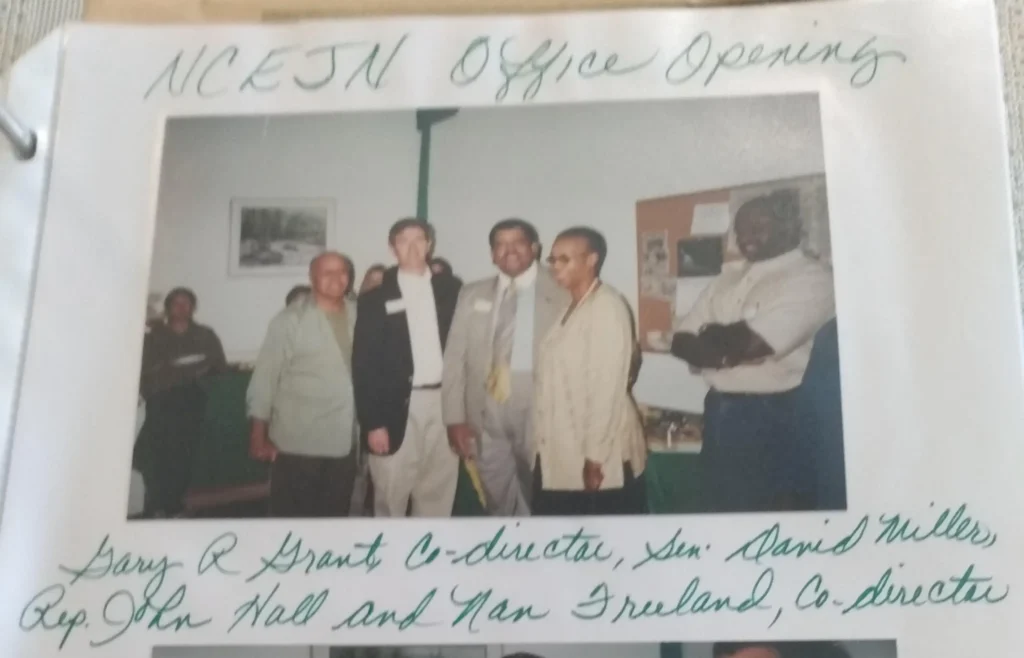
NCEJN opens its 2nd office in Tillery, N.C. The 1st office was in Raleigh on Blount Street. Pictured are Gary Grant, Sen. David Miller, Rep. John Hall, and Nan Freeland.
2002
Devon Hall and Dethula Baron-Hall founded the Rural Empowerment Association for Community Help (REACH).
2006
Coalition was formed to fight hog CAFOs. NCEJN, REACH, the Waterkeeper Alliance, and Riverkeeper began meeting monthly to develop a plan to secure a permanent extension of the moratorium on hog farming, which the State of North Carolina had the option to renew in 2007.[1]
[1] Interview with Naeema Muhammad. Interview by Emma Jo Donnelly. June 26, 2024. Zoom.
June 19-21, 2007
Community members engaged in a Fifty-One Hour Hog Vigil at Halifax Mall to pressure legislators to extend the moratorium on hog CAFOs. North Carolina policy makers made the moratorium permanent later that year.
December 12-14, 2008

The 7th Bi-Annual Southern Human Rights Organizers’ Conference (SHROC VII) was held in Durham, N.C. It was a unique opportunity for human rights organizers and defenders to come together to share strategies, learn from each other, and build relationships.
2009
NCEJN began working with the Rogersv& Eubanks Neighborhood Association in their decades-long efforts to fight against the public health impacts that resulted from a landfill installed in their community in the 1970s.[1]
2010s
September 22, 2012
Dr. Steve Wing, Dr. Valerie Johnson, Dr. Sacoby Wilson, and Dr. Chris Heaney served as panelists in a North Carolina Title VI & Environmental Justice Interagency & Community Workshop titled, “Scientific Data Collection to Support Legal Compliance & Enforcement,” held at North Carolina Central University in Durham, N.C.
September 12, 2013
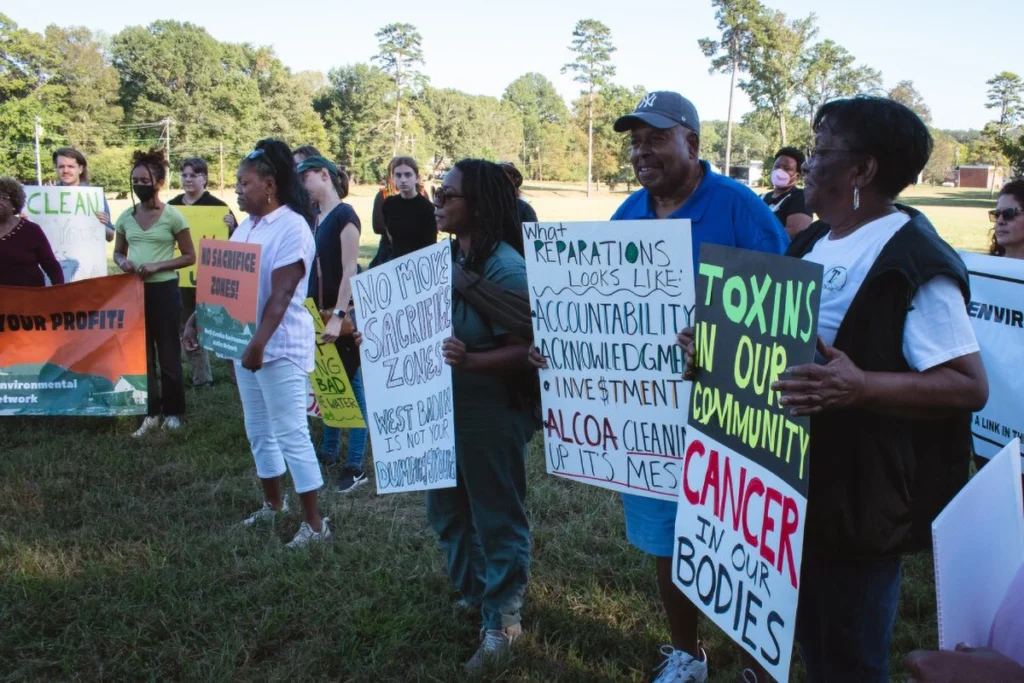
The Concerned Citizens of West Badin Community formed to formalize decades of organizing against the hazardous impacts of the Alcoa aluminum smelting facility.[1]
[1] https://ncejn.wordpress.com/2013/09/18/ncejn-congratulates-the-concerned-citizens-of-west-badin-community/
October 2013
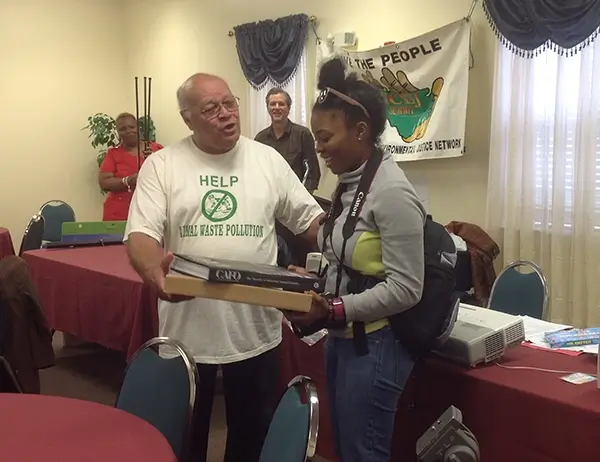
At NCEJN’s 15th Summit at the Franklinton Center, Gary Grant gives a raffle prize to a Bennett College student as Steve Wing and Cynthia Brown look on.
June 16, 2014
June 16, 2014: The Royal Oak Concerned Citizens Association successfully blocked Brunswick County’s plan to expand its landfill, located in the majority African American Royal Oak community.[1]
2014
500+ North Carolina community members filed lawsuits against Smithfield Foods for damages to their property, health, and wellbeing caused industrial hog operations [1]
October 2016
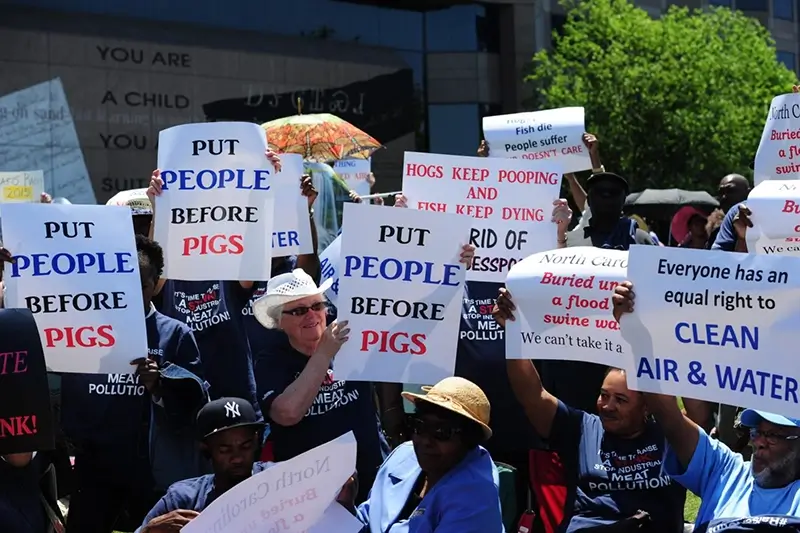
Over twenty community members traveled to Washington, D.C. to speak with EPA and other governmental officials about the discriminatory impacts of hog CAFOs on Black communities in southeastern North Carolina.[1] They carried with them a petition signed by 95,000 people that demanded that EPA Office of Civil Rights investigators travel to southeastern North Carolina to witness these hazards themselves.[2]
[1] Haddix, Elizabeth. Interview by Emma Jo Donnelly. North Carolina Environmental Justice Network Internal Archive. Zoom: August 23, 2024.
Mid-November 2016

Directly motivated by the October petition and in-person organizing efforts, EPA Office of Civil Rights investigators traveled to southeastern North Carolina to research the impacts of living near industrial hog operations.[1]
January 12, 2017
In a nationally unprecedented move, the External Civil Rights Compliance Office of the EPA issued a formal letter of concern to what is now the Department of Environmental Quality (DEQ) about the Title VI Civil Rights complaint made by NCEJN, REACH, the Waterkeeper Alliance, and Earthjustice regarding the permitting of hog CAFOs in Black communities.
2017
The North Carolina General Assembly amended the Right to Farm Law to limit the damages that could be awarded in nuisance lawsuits to losses in property value.[1]
April 10, 2017

Naeema Muhammad, co-director of NCEJN and an opponent to HB 467, a bill that limits liability in nuisance cases, attended the floor debate in Raleigh, N.C.
May 3, 2018
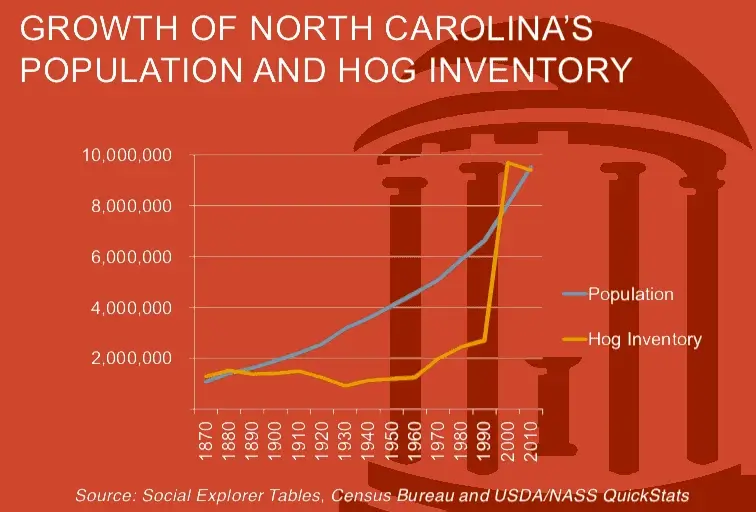
NCEJN, REACH, and Waterkeeper Alliance agreed to a settlement with the North Carolina Department of Environmental Quality (DEQ) on the Title VI complaint the groups had filed with the Environmental Protection Agency (EPA) in 2014.
May 2018
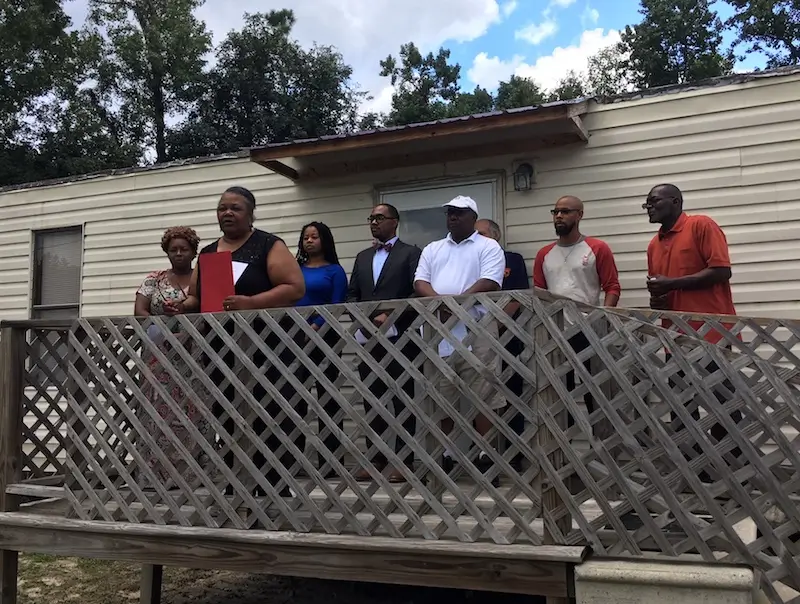
The North Carolina Department of Environmental Quality (DEQ) created the Environmental Justice & Equity Board. Naeema Muhammad was among the environmental justice leaders appointed to the board.
June 15, 2018

The Farm Act of 2018 amended the Right to Farm Law to severely limit agricultural and forestry nuisance lawsuits by 1) restricting these lawsuits to plaintiffs owning property within half a mile from the operation and 2) requiring that property owners file within one year of the opening or major changes of operation. The passage of this law followed soon after community members received multi-million dollar verdicts in their lawsuits against Murphy-Brown of Smithfield Foods.
August 3, 2018
A jury awarded North Carolina community members $473.5 million in their lawsuit against Smithfield. However, due to the recent amendment of the Right to Farm Law, the U.S. District Court in Raleigh lowered the amount to around $98 million.[2] Even so, Smithfield appealed this nuisance award.
Early August 2018
Northampton County Citizens Against Coal Ash successfully pushed their county planning board to deny rezoning for a coal ash landfill. Over 300 community members attended that meeting to protest the landfill.
September 14, 2018
Hurricane Florence made landfall in North Carolina, devastating the southeastern part of the state with floods and hog waste overflow crises.[1]
February 13, 2019
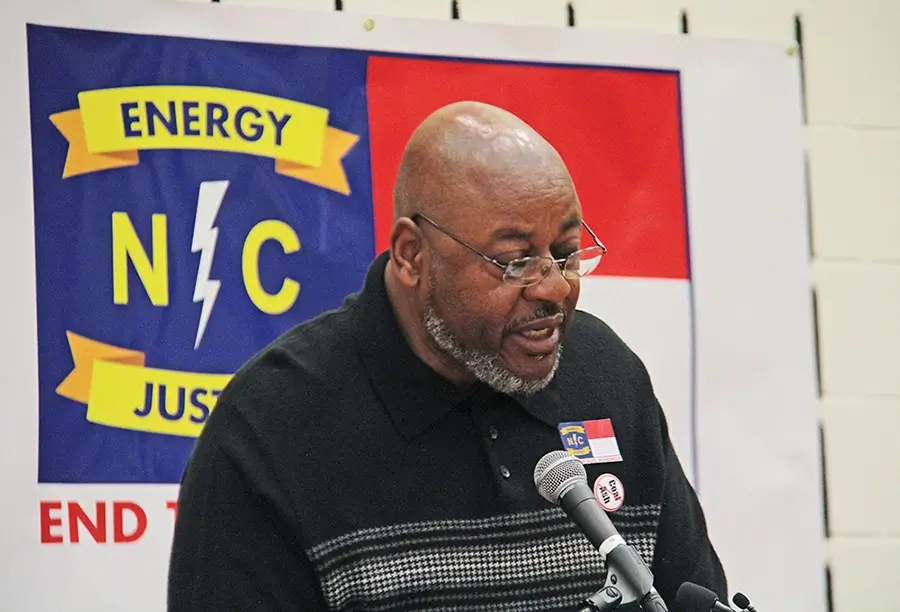
February 13, 2019: Energy Justice NC: End the Duke Monopoly campaign publicly launched. Bobby Jones of the Down East Coal Ash Coalition made the announcement.
October 31, 2019
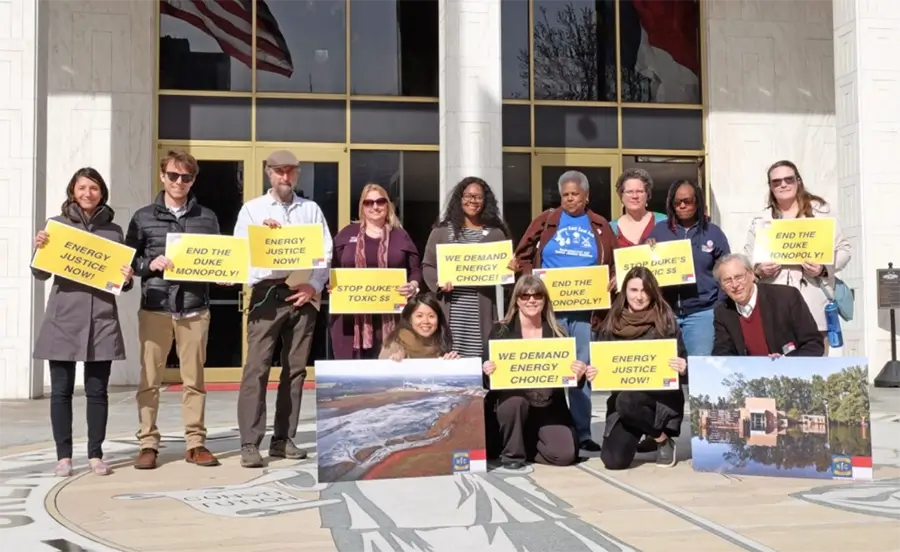
The North Carolina Senate unanimously passed SB559, a win for Energy Justice NC organizers as that bill excluded Duke Energy’s ratemaking provision.
2020s
Summer 2020
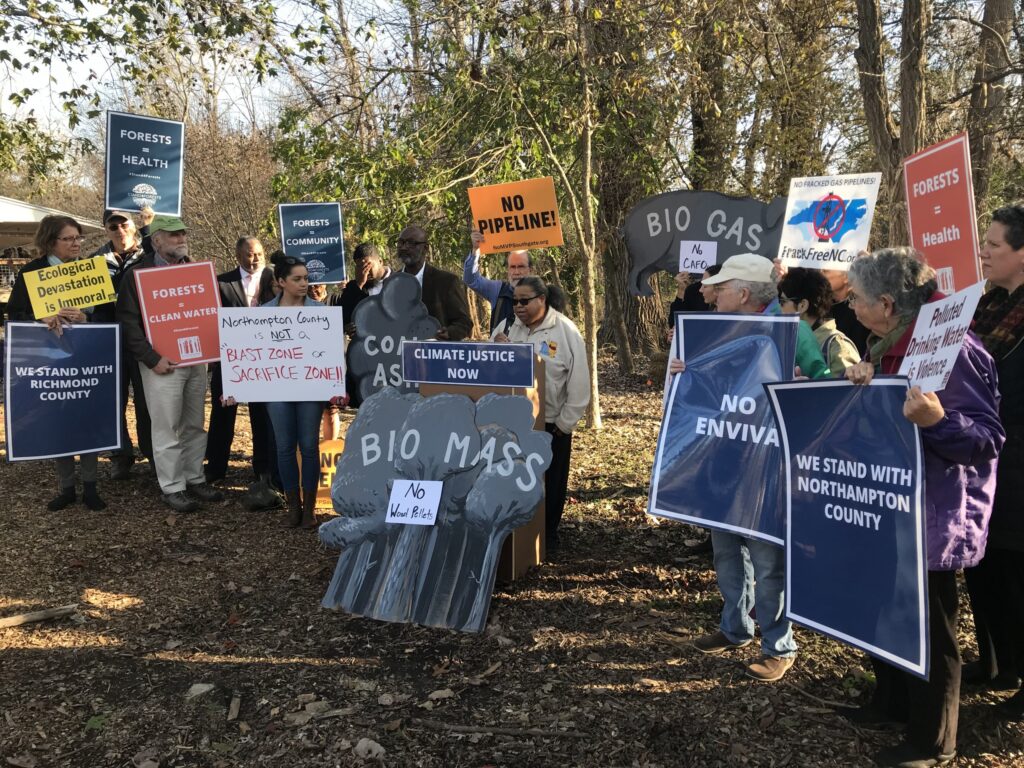
Residents of Robeson County successfully organized against the siting of a wood pellet facility in their county.
November 2020
Smithfield Foods agreed to a settlement with the community members who had sued the company for damages from industrial hog operations near their properties.[1] The settlement followed soon after the decision by the Fourth U.S. Circuit Court of Appeals in Richmond, Virginia to reject Smithfield’s appeal of a lower court’s decision to award millions of dollars of damages to the plaintiffs.[2]
2021
The National Academy of Science published a study investigating the number of deaths in the United States caused annually by agricultural pollutants.[1] The study found that 80% of the 17,900 deaths caused by agricultural air pollution resulted from pollution generated by industrial animal operations[1] and that 25% of these deaths resulted from industrial hog operations.[1]
September 24, 2022
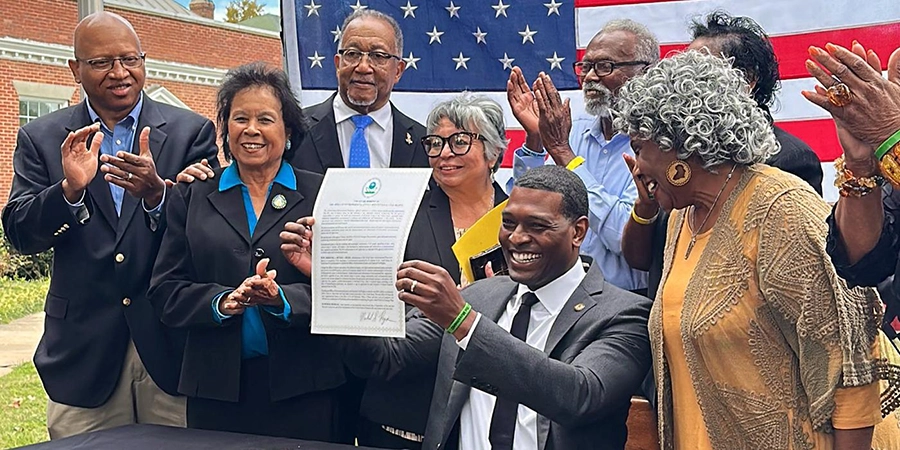
The EPA announced its creation of its Office of Environmental Justice and External Civil Rights.[1]The announcement was made in Warren County, North Carolina.
[1] https://sph.umd.edu/news/epa-elevates-environmental-justice-new-national-office
January 2023
NCEJN launched Spidey-Sens-r, a community science project to monitor air quality using spider webs.
September 2023
NCEJN and twelve other environmental groups sued the EPA for failing to regulate industrial animal operations.[1]
Summer 2024
Greensboro residents successfully blocked the city’s plan to move waste from the preregulatory landfill underneath Bingham Park to the White Street Landfill.[1]
October 18-20, 2024
Twenty-Fifth Annual North Carolina Environmental Justice Summit



















